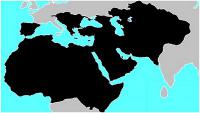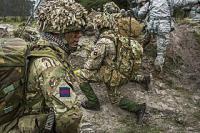-
Body of Paris attacks' mastermind identified
The French prosecution has just announced that forensic evidence confirms that Abdelhamid Abaaoud, the 27-year old Belgian who was the mastermind of Friday’s attacks in Paris, was killed in Wednesday’s police raid on an apartment building in St.-Dennis. Abaaud’s 26-year old cousin killed herself by exploding a suicide vest, and the police now say that there may be a third body under the rubble of the partially collapsed third floor of building.
-
-
Teenager who used student loan to fly to Syria to join ISIS sentenced to five years in jail

Yahya Rashid, 19, described by the British police as a street-smart teenager who conned his way into university and then spent his student loan on a trip to Syria to join ISIS, has been sentenced to five years in jailed. Rashid used a forged documents to gain acceptance to Middlesex University, and received £6,326.96 in student loans. He used the cash to buy five plane tickets for a trip to Turkey on 26 February so he and four friends could cross into Syria and join ISIS.
-
-
Why jihadism appeals to religiously illiterate loners
Many of the jihadist killers, as they shoot their innocent victims, invoke God with the Arabic phrase “Allahu Akbar.” Indeed, this otherwise innocuous everyday religious utterance is frequently usurped as a jihadist battle cry. But those drawn to jihadism are usually not particularly religious prior to their involvement with violence. They are either raised in largely secular households or possess only a rudimentary grasp of their parental faith, which rarely extends to religious practice of any sort. It is not to exonerate religion in any sense to say that for many French Muslims, whose life in the banlieues consists of not much more than a mix of unemployment, crime, drugs, institutional racism, and endemic cycles of poverty and disenfranchisement, jihadism potentially offers a way out of the banal and inane drudgery of daily life. In direct contrast to feelings of boredom, purposelessness, and insignificance, the jihadists offer redemption through the image of the chivalrous warrior, recast as some sort of avenging hero.
-
-
Virginia mayor says WWII Japanese internment “inspires” his policies toward Syrian refugees

Roanoke, Virginia, mayor David Bowers (D) got into hot water on Wednesday when he issued a statement citing the U.S. internment of Japanese during the Second World War as an inspiration for his decision to delay assistance to Syrian refugees. Roosevelt, in the name of national security, ordered the forcible relocation of more than 100,000 Japanese immigrants and Japanese-Americans living in the United States to internment camps for more than three years. The internment is regarded as one of the most serious civil-liberties violations committed by the U.S. government.
-
-
Iran began dismantling its nuclear program, but has way to go to come into full compliance: IAEA

The IAEA says that Iran has begun dismantling parts of its nuclear program, as agreed in a deal with the P5+1 powers – but that it has some way to go before coming into full compliance with the agreement. Iran has removed 4,500 centrifuges from the Natanz and Fordo site – but it has to remove 10,000 more before 15 December. Iran has added 460 kg low-enriched uranium to its stock – it now has 8.3 tons of low-enriched uranium – but that stock must be slashed to just 300kg by 15 December. If Iran does not meet in full these, and other, clauses in the agreement by 15 December, the economic sanctions will not be lifted.
-
-
Fate of suspected mastermind of Paris attacks still unclear
The fate of Abdelhamid Abaaoud, the mastermind of Friday’s attacks in Paris, is still unclear after a massive early morning raid by the French police on an apartment building in the Paris suburb of Saint-Dennis. The Washington Post reported that the 27-years old Belgian of Moroccan origins was one of the two people killed in the raid, but other news outlets in France and the United States – including all leading French media — report that Abaaoud’s fate is unknown. The French authorities say that forensics experts have been combing the partially destroyed, seeking DNA and other evidence. Since the Friday attacks, the French police have launched 414 raids on sites where terrorists and terrorist supporters were suspected to be hiding.
-
-
2 dead, 7 arrested in French police raid on apartment building in search of attacks’ mastermind
About 200 members of the special units of the French police early Wednesday morning (Paris time) swooped on the Parisian banlieue, or suburb, of Saint-Denis – where the Stade de France, one of the sites of Friday’s terrorist attacks, is located – and arrested seven people. Two people were killed. One of the dead was a young woman who blew herself up with a suicide vest. French Prosecutor Francois Molins told reporters that the operation was a result of a credible tip — in all likelihood, a police informer who resides in the neighborhood — suggesting Abdelhamid Abbaaoud, a 27-year-old Belgian of Moroccan origin, was holed up in an apartment in a residential building.
-
-
Visa Waiver program more serious threat than refugees: Senate Intel. Comm. chair
Senator Richard Burr (R-North Carolina), chairman of the Senate intelligence committee, said that terrorists who are citizens of Visa Waiver countries – and who, therefore, can travel from Europe to the United States without a visa — pose a more serious threat to U.S. security than refugees from Syria. Senator Dianne Feinstein (D-California), vice-chairman of the intelligence committee, said that around 13 million people enter the United States each year through the Visa Waiver program, but she also understands that more than 40 million stolen travel documents are on the black market in Europe.
-
-
NATO should invade ISIS-held territory

In response to the terrorist attacks in Paris and Beirut, NATO should invade ISIS-held territory with the goal of creating two semiautonomous, predominantly Sunni Arab regions under restored Syrian and Iraqi sovereignty. This would be difficult and costly. But it is perhaps the only path to long-term solutions of both the Syrian refugee crisis and the threat of ISIS. No options are good, but this is the least bad alternative, and it will give all relevant regional and international actors something they want. Diplomacy is essential to a long-term solution to the Syrian civil war. But someone needs to take over ISIS’ territory, and local forces cannot do it alone. President Obama should reconsider his refusal to contribute ground forces. If he won’t, additional American advisers, special operations forces, air strikes, and intelligence could help troops from other NATO countries and local actors defeat ISIS and reach a lasting solution.
-
-
Boko Haram has destroyed 1,100 schools so far this year: UN
So far this year, the Nigerian Islamist group Boko Haram has destroyed an estimated 1,100 schools in north-east Nigeria, Cameroon, Chad, and Niger, the UN said. Analyst estimate the Boko Haram has killed about 17,000 people since it began its insurgency in 2009.
-
-
Paris terrorist attacks reignite debate over end-to-end encryption, back doors
The exact way the terrorists who attacked France last Friday communicated with each other, and their handlers, in the run-up to the attack is not yet clear, but the attack has prompted law enforcement and intelligence agencies in Europe and the United States to renew their call to regulate the use of new encryption technologies which allow users to “go dark” and make it difficult, if not altogether impossible, to retrieve the contents of communication.
-
-
Increasing toll: Terrorists killed 32,658 people in 2014 compared to 18,111 in 2013
New report finds that finds that the number of lives lost to terrorism increased by 80 percent in 2014, reaching 32,658 — the highest level ever recorded. This compares to 18,111 deaths in 2013. The global economic cost of terrorism reached an all-time high at $52.9billion, compared to $32.9 billion in 2013, and a tenfold increase since 2000. Terrorism is highly concentrated, with 78 percent of all deaths and 57 percent of all attacks occurring in just five countries: Afghanistan, Iraq, Nigeria, Pakistan, andSyria. Boko Haram and ISIS were jointly responsible for 51 percent of all claimed global fatalities in 2014. Lone wolf attackers are the main perpetrators of terrorist activity in the West, causing 70 percent of all deaths over the past ten years. Islamic fundamentalism was not the main driver of terrorism in Western countries: 80 percent of lone wolf deaths were by political extremists, nationalists, and racial and religious supremacists.
-
-
Mass-casualty terrorist attacks on the rise, with 11 attacks in first half of 2015
Mass casualty terrorist attacks, defined as attacks which kill more than 100 people (excluding perpetrators) in a particular country on a particular day, are on the rise. Between 1970 and 2014 there have been 176 such attacks. Between 2000 and 2014, there were mass casualty attacks in twenty-five countries, but most of them occurred in Iraq and Nigeria. Between January and June 2015 there were eleven attacks in which terrorists killed more than 100 people in a single country on a single day.
-
-
France’s invokes EU treaty’s mutual defense assistance article
Jean-Yves Le Drian, France’s defense minister, has formally asked other EU members for help in fighting ISIS — the first time ever that the EU treaty’s article 42.7, the EU mutual assistance article, has been invoked. Article 42.7 of the EU treaty states that in the event of “armed aggression” EU countries have “an obligation of aid and assistance by all means in their power.” Article 42.7 has been added to the Lisbon Treaty in the wake of the 2004 attack by al-Qaeda terrorists on a train in Madrid, an attack in which 192 people were killed.
-
-
EU explores ways to bolster European defenses against terrorism
European interior and home-affairs ministers will meet in an emergency session in Brussels this Friday to explore measures to strengthen the RU zone’s defenses against terrorism. The main topics to be discussed on Friday will include a Europe-wide database of airline passengers, firearms security, and the bolstering of security of external borders, that is, the borders between the Schengen Agreement countries and those European countries not members of the treaty. France said that it would also insist on reintroducing national border checks within the Schengen zone – in effect, suspending the Schengen Agreement.
-
More headlines
The long view
Factories First: Winning the Drone War Before It Starts
Wars are won by factories before they are won on the battlefield,Martin C. Feldmann writes, noting that the United States lacks the manufacturing depth for the coming drone age. Rectifying this situation “will take far more than procurement tweaks,” Feldmann writes. “It demands a national-level, wartime-scale industrial mobilization.”
No Nation Is an Island: The Dangers of Modern U.S. Isolationism
The resurgence of isolationist sentiment in American politics is understandable but misguided. While the desire to refocus on domestic renewal is justified, retreating from the world will not bring the security, prosperity, or sovereignty that its proponents promise. On the contrary, it invites instability, diminishes U.S. influence, and erodes the democratic order the U.S. helped forge.
Fragmented by Design: USAID’s Dismantling and the Future of American Foreign Aid
The Trump administration launched an aggressive restructuring of U.S. foreign aid, effectively dismantling the United States Agency for International Development (USAID). The humanitarian and geopolitical fallout of the demise of USAID includes shuttered clinics, destroyed food aid, and China’s growing influence in the global south. This new era of American soft power will determine how, and whether, the U.S. continues to lead in global development.
Water Wars: A Historic Agreement Between Mexico and US Is Ramping Up Border Tension
As climate change drives rising temperatures and changes in rainfall, Mexico and the US are in the middle of a conflict over water, putting an additional strain on their relationship. Partly due to constant droughts, Mexico has struggled to maintain its water deliveries for much of the last 25 years, deliveries to which it is obligated by a 1944 water-sharing agreement between the two countries.
How Disastrous Was the Trump-Putin Meeting?
In Alaska, Trump got played by Putin. Therefore, Steven Pifer writes, the European leaders and Zelensky have to “diplomatically offer suggestions to walk Trump back from a position that he does not appear to understand would be bad for Ukraine, bad for Europe, and bad for American interests. And they have to do so without setting off an explosion that could disrupt U.S.-Ukrainian and U.S.-European relations—all to the delight of Putin and the Kremlin.”
How Male Grievance Fuels Radicalization and Extremist Violence
Social extremism is evolving in reach and form. While traditional racial supremacy ideologies remain, contemporary movements are now often fueled by something more personal and emotionally resonant: male grievance.
